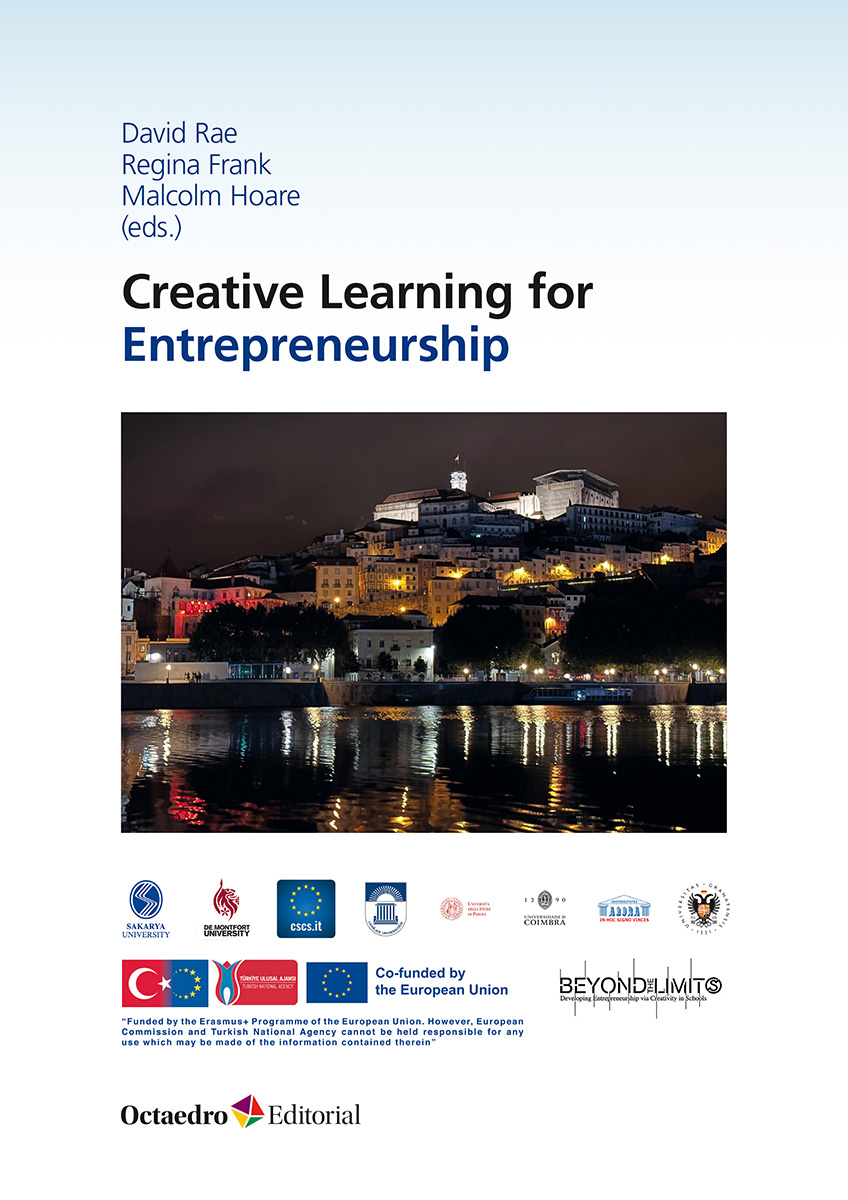FICHA TÉCNICA
Creative Learning for Entrepreneurship
Edición: David Rae, Regina Frank, Malcolm Hoare
OPEN ACCESS
Presentación
This book was created as a learning resource which enables readers to develop their understanding and skills in creativity and entrepreneurship. It is written for anyone interested in creativity, entrepreneurship, education and learning, and in how these topics interconnect. It can be used by individual readers, students, educators, researchers, and people working in enterprise and small business support. In education, it is intended mainly for use at advanced and higher education levels.
The book was created as part of the European Erasmus project, ‘Beyond the Limits – Developing Entrepreneurship via Creativity’ which ran from 2020 to 2023. The 18 chapters were written by leaders, authorities and innovators in creativity, entrepreneurship and learning.
The book is organised in four themes, each of which comprises four or five chapters. All the chapters can be read and used freely and separately as educational and teaching resources.
- Creative entrepreneurship and human development
- Pedagogies for creative learning and education
- Pedagogies for entrepreneurial learning and education
- Social, community, and collective learning for creativity and enterprise.
Índice
Foreword
Introduction
1. Creative entrepreneurship and human development
1.1. Basics and Theories of Creativity (Ömer Faruk Vural, Osman Titrek, Mustafa Bayrakçı, Gözde Sezen)
1.2. The Basic Principles of Entrepreneurship (Gözde Sezen, Mustafa Bayrakçı, Osman Titrek, Ömer Faruk Vural)
1.3. Understanding human creativity through biology, genetics and culture (Meriem Khaled Gijón, Pablo García Sempere, Miguel C. Botella López, José Gijón Puerta)
1.4. How can neuroscience inform entrepreneurial behaviour, creativity and education? (Albertina L. Oliveira, Diana Monteiro Pinto, Carlos Francisco de Sousa Reis, Teresa Ribeiro Pessoa, António Ferreira)
1.5. Early influences on entrepreneurship career path development (Ilze Miķelsone, Linda Pavitola, Jana Grava)
2. Pedagogies for creative learning and education
2.1. The Creative Curriculum (Enrico Valori)
2.2. Creativity and critical thinking: Conceptions and dynamics (Carlos Francisco de Sousa Reis, Diana Monteiro Pinto, Teresa Ribeiro Pessôa, Albertina Lima Oliveira, António Ferreira, Mirzana Pašić Kodrić)
2.3. Fostering Creativity in Students: Tools and Methods for Teachers (Felix-Angel Popescu, Dan Petrica)
2.4. Educational Strategies For Teaching Creativity (Emilio J. Lizarte Simón, María del Carmen Galván Malagón, Marisa Hernández Ríos, Meriem Khaled Gijón)
3. Pedagogies for entrepreneurial learning and education
3.1. Enterprise Education – Developing and structuring positive learning experiences (Malcolm Hoare)
3.2. Enhancing green entrepreneurship education and skills in the context of Latvia (Linda Pavitola, Jana Grava, Ilze Miķelsone)
3.3. The entrepreneurial Competence: Face to Face and Virtual Learning Environments to Foster Entrepreneurship in the Post-Pandemic Age (Pablo García Sempere, Emilio J. Lizarte Simón, María del Carmen Galván Malagón, José Gijón Puerta)
3.4. The Effects of Creative Student Education on Entrepreneurship and Economic Sustainability in Economics and Management Sciences (Selim Inançlı, Abdurrahman Benli, Özlem Balaban, Cahit Şanver, Mert Öner)
3.5. Nurturing the entrepreneurial mindset: Exploring motivation, personality, and Creativity in Entrepreneurship (Felix-Angel Popescu, Laurențiu Petrila, Dan Petrica)
4. Social, community, and collective learning for creativity and enterprise
4.1. Communities of practice and creativity (Corrado Petrucco and Michele Biasutti)
4.2. Creativity Is Plural As Well As Singular (David Rae)
4.3. Creativity and entrepreneurship in higher education through the framework of the Sustainable Development Goals (Eleonora Concina, Sara Frate, Michele Biasutti)
4.4. Co-creative design in education: some practical examples (Giovanni Crisonà)
David Rae, Malcolm Hoare, Regina Frank
9788410054127
90025-1
